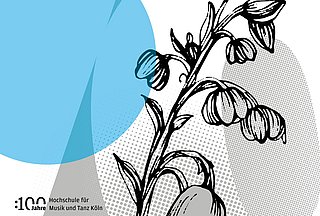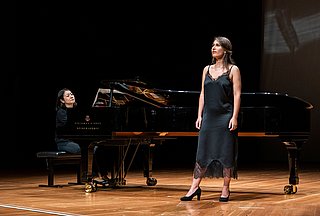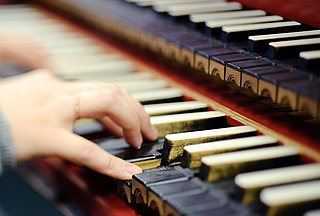Master of Music -
Historical instruments & baroque singing
Old music, new potential.
With its Bachelor's and Master's degree programs, the HfMT Cologne offers excellent training in historical instruments and baroque singing. In addition to individual instrumental and soloistic skills, special emphasis is placed on communicative music-making: Therefore, chamber music and ensemble lessons as well as professional stage practice are a firmly integrated part of the Early Music degree program. In addition, comprehensive knowledge of harmony and music theory is taught and promoted.
The wide-ranging curriculum guarantees students a foundation that will enable them to face the challenges of the professional world with confidence. The Department of Historical Instruments is part of the Institute for Early Music in Cologne. Get to know the institute.
If you have any questions about the course, please get in touch with the relevant contact person(s).
Basic information
| Degree | Master of Music |
|---|---|
| Period of study | 4 Semester |
| Course begin | Wintersemester |
| ECTS points | 120 Credits |
| Major subjects | Barockgesang, Barockoboe, Barockviola, Barockvioline, Barockvioloncello, Blockflöte, Cembalo, Fortepiano, Laute, Naturhorn, Naturtrompete, Traversflöte, Viola da Gamba |
| Continuing study options | Concert exam |
Special features of the study programme
The respective artistic majors are staffed with an international team of professors as well as special lecturers who have made a name for themselves as musicians worldwide. Their experience and pedagogical aptitude ensure that the necessary prerequisites for the future professional field are imparted in the best possible way. There are intensive connections with the renowned baroque orchestras and ensembles based in Cologne. Many students of the Institute of Early Music are given the opportunity to participate musically and to establish professional contacts. The Cologne University of Music thus has an almost complete range of courses in the field of early music, which is optimally geared to the requirements profile of future professional musicians. The practical relevance to current concert life is guaranteed by the events and projects that take place regularly. These concert performances have become a present part of the cultural landscape of NRW and are highly appreciated by the public.
Application and aptitude test
Applications are submitted online via the muvac platform. All information on the procedure can be found on our application page.
Admission requirements
- Successful completion of a four-year Bachelor's degree or a comparable degree.
- Students who have not graduated from a German-speaking institution must prove that they have sufficient German language skills (min. level A2 according to the European Framework of Reference).
- Successfully passed aptitude test.
Qualifying examination
The aptitude test consists of an artistic-practical examination in the respective main subject. The examination lasts approx. 20 minutes. Detailed information can be found in the aptitude test regulations, especially in the appendix for content requirements and conduct of the test. For the artistic degree programmes, we recommend contacting the main subject teacher of your choice in good time; you will be gladly advised personally.
Course of studies and examination regulations
The Master's programme for the subjects historical instruments - baroque string and wind instruments as well as historical keyboard instruments and baroque singing - is designed for a total of four semesters. Teaching in the artistic main subject takes on a special significance with 1.5 hours per week. It is equally important to teach students comprehensive playing practice of baroque ensemble literature in chamber music lessons. Depending on the artistic major, a baroque melody instrument or harpsichord is added as an instrumental second subject. This degree programme, with its focus on historical performance practice, includes further modules that deal with the special stylistics of the 16th to 18th centuries: The theoretical and practical basics in the subjects of thoroughbass, baroque harmony, score theory as well as musicology are taught in small groups and round off the educational spectrum.
Documents & downloads
Further downloads can be found on our central download page .
Current events
Fronleichnamskirche der Ursulinen Köln

Konzertsaal Köln

Kammermusiksaal Köln


Contact

|
Leonard.Schelb@hfmt-koeln.de |
|
| Address |
Hochschule für Musik und Tanz Köln Unter Krahnenbäumen 87 50668 Köln |
